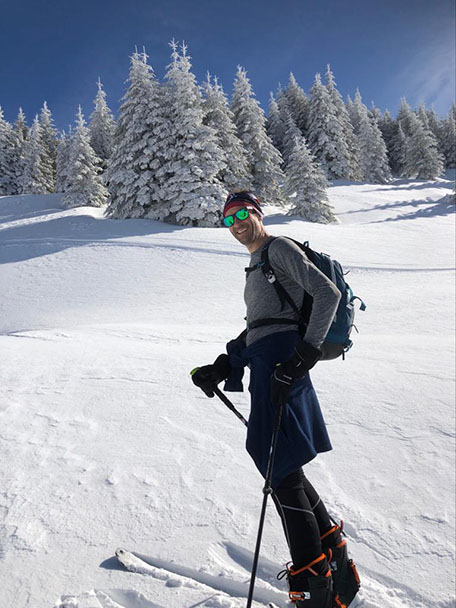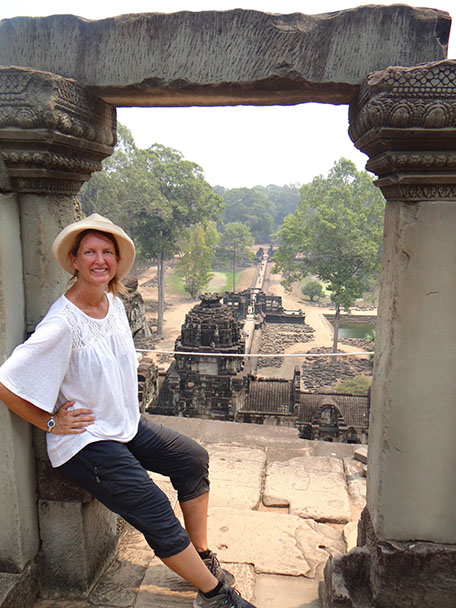David Cox is having a blissful retirement: living in the French Alps, skiing in the winter, cycling in the summer and travelling when he can, including four months in Asia and Australia and three in California, Costa Rica and Colombia. What’s more, he is only in his fifties.
For David, a former accountant, whose wife Sally is a primary school teacher, retiring at the age of 47 wasn’t part of the plan. He was saving hard, aiming for financial independence, in order to have financial security for his family, including his two grown-up children. “I thought that if I lost my job, it would be a disaster for us so I wanted to be in a financial situation whereby we could survive. In reality, I could have got another job but my brain seemed to focus on a doomsday scenario.”
Luckily, no doomsday scenario came to pass, and he was, instead, in the brilliant position to stop working altogether by his mid-forties. He is now a proponent of planning how to retire years before the state pension age, and shares his advice and experience on the blog iretiredyoung.net Link opens in a new window, which he writes between travelling and meeting friends for coffees whenever he likes. “Many things are possible when we really put our minds to it,” he says. “To have the finances to do what I’ve done

David started his career as an accounts clerk on a very low salary, aged 18. By the time he’d retired, he’d worked a total of 29 years, of which 17 were overseas, which helped because he paid less tax. But – key to his success – he didn’t give into ‘lifestyle creep’, saving hard during his peak earning years.
“Tracking our costs acted as a natural brake to make sure we weren’t spending too much on things we actually didn’t want or need. I always kept a record of how much we had in our accounts, savings and investments at the end of each month, which was really motivating to see how it was growing.”
His main advice is not to try to keep up with the Joneses, and actually think about what you are spending and why. “Do we need such a big house and car, are these things really making us happy? A balance is important, but my experience is that it’s easy to waste a lot of money on things that we don’t actually want that much. And if you are young enough, start early to get the greatest benefit from the compounding effect on your investments.”
Meanwhile Michelle, who also writes at fireandwide.com, gave up her job in energy trading at age 43, two years ago, and says a lot of people are understandably curious about how on earth she managed it. “There was nothing particularly complicated or unusual involved,” she says. “My story is a hopefully inspiring one of hard work, patience and sensible risk-taking that has paid off.

“I maxed out my workplace pensions early on. This created a good level of cash flow for my later years. I then have an individual SIPP (self-invested personal pension) which contains low-cost ETFs (exchange traded funds) and individual shares. I will use this from age 57 once I’m able to access it.”
She was earning an above-average salary before she retired, but she doesn’t think her job was the main reason she could retire early. “When I started out, I was paid just above minimum wage. By working in London and commuting each day from Norfolk, I kept living costs low. It meant a hideously early start and late finish but increased my ability to save and invest.”
She also looked to earn money elsewhere, and with her partner bought rental properties that they repaired, maintained, let and managed themselves. They also built their own home without taking out a mortgage. “It wasn’t easy as we took on as much of the DIY as we could safely and legally do. We’d often camp out over the weekend, just to be able to finish up a wall of brickwork.” Ultimately, though she says being able to retire early is all about maximising the difference between what you earn and what you spend and then investing wisely. And the earlier you start, the better.
“What makes early retirement possible is being able and happy to live below your means. For most people that is entirely possible, it’s just choosing what matters most to you.” If you are in your twenties or thirties and struggling with the cost of housing relative to salaries, it may seem like wishful thinking. But you can start thinking young about how to put yourself in the best position to retire when you want.
“As soon as you start work, invest the most into your pension that you can afford,” says Rebecca O’Connor, head of pensions and savings at Interactive Investor. “The longer your money is invested for, the more chance it has to benefit from investment growth. This really does have a huge impact on your pension pot and starting just a few years earlier and putting in, say, 10 per cent of earnings rather than the minimum 8 per cent, can mean tens of thousands of pounds extra in your pot when you retire.”
Also, she points out, that cautious investment choices in a pension could be a wasted opportunity if you are young. “You are usually given a choice of risk level by your employer. Remember that higher risk means higher growth over the long term. In your early career, time is on your side, you have decades to see that higher risk decision pay off.”
Also check to see if your employer “double matches” your pension contributions, meaning whatever you put in, they’ll put in twice as much. An effective pay rise for your future self. Michelle said her dream to retire early didn’t become a real plan until her mid-thirties when she sat down and tried to work out when and how she could travel more.
“The first place to start is by working out your own plan. What matters to you? What level of expenditure can you comfortably live with? Think about how you spend your money currently, does everything really bring you value? Look at your career, your earnings. How can you improve or add different income streams?”
“Early retirement is not a quick path and there is no point being miserable on your journey so keep it realistic but don’t waste money. Think of it instead as buying yourself time instead of ‘stuff’.” And lastly, she says be patient: over time the magic of compounding interest will start to show, “and that’s when it starts to get really interesting.”

